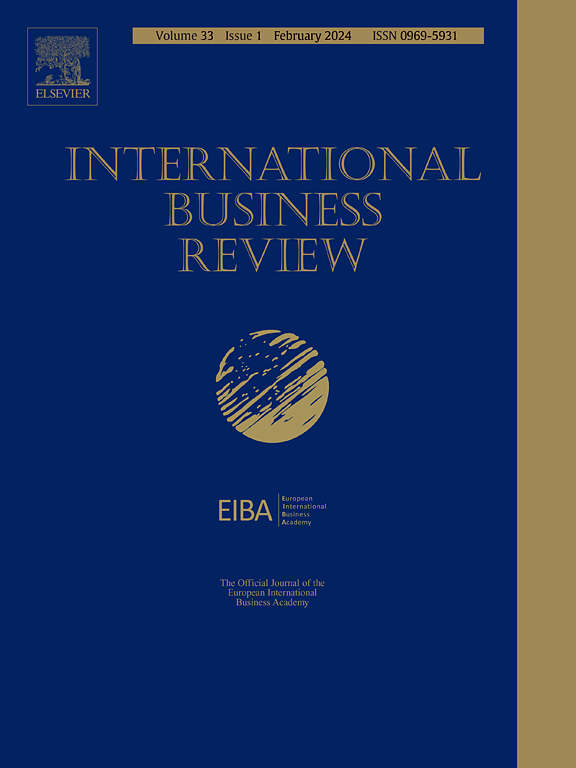公司所有制类型与国际化战略:母国资本主义的调节作用
IF 6.1
1区 管理学
Q1 BUSINESS
引用次数: 0
摘要
尽管学术界普遍认为企业所有权会影响国际化,但对于哪种所有权类型会促进国际化存在分歧。此外,还需要考虑国际化战略的风险差异:销售国际化(低风险战略)和资产国际化(高风险战略)。此外,母国资本主义可以缓和这些关系——这种关系在此类研究中尚未得到检验。本文以美国、西欧和新兴市场公司为样本,解决了这些研究空白。它考察了五种不同的公司所有权类型(政府、家族、机构、管理和公司)和母国资本主义如何影响国际化战略。我们发现,政府所有权降低了销售国际化。家族和机构所有权增加销售国际化,而机构、管理和公司所有权增加资产国际化。较高的母国资本主义降低了机构所有者和公司所有者对销售国际化的影响,同时增加了所有五种所有权类型对资产国际化的影响。我们的研究结果对公司治理和国际化的文献和实践具有启示意义。本文章由计算机程序翻译,如有差异,请以英文原文为准。
Corporate ownership types and internationalization strategies: The moderating role of home country capitalism
Despite widespread academic consensus that firm ownership impacts internationalization, there is disagreement on which ownership type increases internationalization. Also, the risk differentials of internationalization strategies need to be considered: sales internationalization (a low-risk strategy) and asset internationalization (a high-risk strategy). Furthermore, home-country capitalism can moderate these relationships – a relationship unexamined in such research. Using a sample of US, Western European, and emerging-market firms, this paper addresses these research gaps. It examines how five different firm-ownership types (government, family, institutional, managerial, and corporate) and home-country capitalism influence internationalization strategies. We find that government ownership reduces sales internationalization. Family and institutional ownership increases sales internationalization, whereas institutional, managerial, and corporate ownership increases asset internationalization. Higher home-country capitalism reduces the impact of institutional and corporate owners on sales internationalization while increasing the impact of all five ownership types on asset internationalization. Our findings have implications for corporate governance and internationalization literature and practice.
求助全文
通过发布文献求助,成功后即可免费获取论文全文。
去求助
来源期刊

International Business Review
BUSINESS-
CiteScore
14.10
自引率
6.90%
发文量
95
审稿时长
62 days
期刊介绍:
The International Business Review (IBR) stands as a premier international journal within the realm of international business and proudly serves as the official publication of the European International Business Academy (EIBA). This esteemed journal publishes original and insightful papers addressing the theory and practice of international business, encompassing a broad spectrum of topics such as firms' internationalization strategies, cross-border management of operations, and comparative studies of business environments across different countries. In essence, IBR is dedicated to disseminating research that informs the international operations of firms, whether they are SMEs or large MNEs, and guides the actions of policymakers in both home and host countries. The journal warmly welcomes conceptual papers, empirical studies, and review articles, fostering contributions from various disciplines including strategy, finance, management, marketing, economics, HRM, and organizational studies. IBR embraces methodological diversity, with equal openness to papers utilizing quantitative, qualitative, or mixed-method approaches.
 求助内容:
求助内容: 应助结果提醒方式:
应助结果提醒方式:


